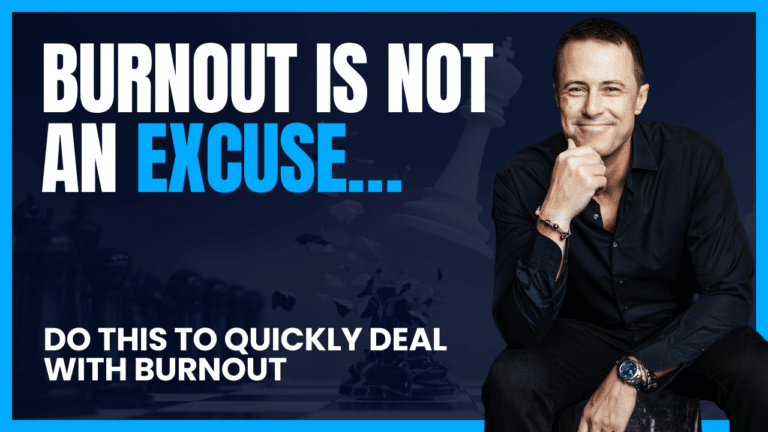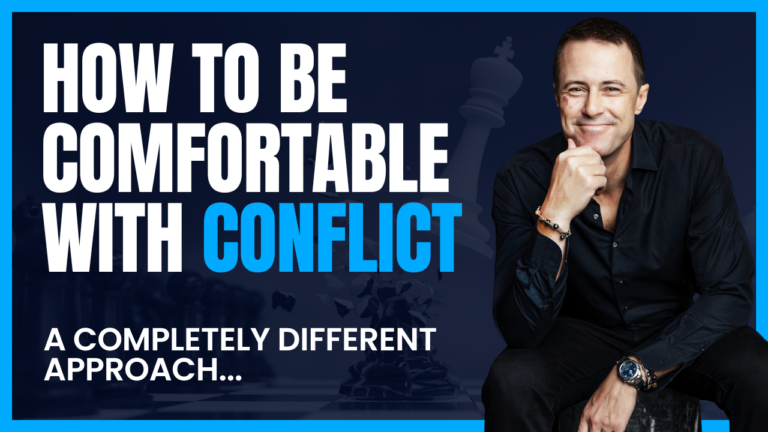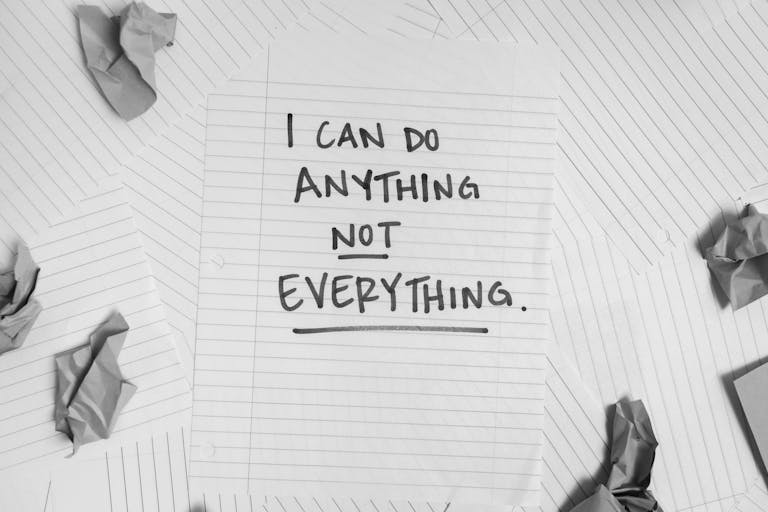Your Feelings Are Not Fortune Tellers
Do you ever feel like things are going to spin out of control? Do you ever feel like things are going to go sideways? Maybe you fear you’ll finally be found out or that you’ll be tested and come up short…
If so, you’re not alone.
I was recently talking to a seasoned founder who was feeling overwhelmed. She kept talking about how she felt like she was going to go out of business.
When I asked her what evidence she had to support that scary conclusion, she started sharing all of the things her mind was using to scare her.
It didn’t take long to realize she had an unconscious formula running in the background of her mind:
Overwhelm + Recent Negative Numbers = Business Failure
While I empathized with how she was feeling, her evidence was weak.
She was focused on the meaning she associated to her feelings, which meant she was ignoring the mountain of evidence supporting the conclusion that her business was doing well.
I wish this was uncommon, but it’s not, so let me be the first to tell you that just because you feel something doesn’t mean it’s going to happen (despite what you may hear).
Your feelings are not your fortune tellers.
Do your feelings have meaning? Yes. But there’s more to the story…
At a minimum, your feelings are a complex mixture of chemistry, self-created meaning, preferences, evolutionary survival strategies, and lots of conditioning. They often provide information or clues. For example:
- Can your feelings indicate that something is off? Of course.
- Can they indicate that you need to address something? Absolutely.
- Can they bring your awareness to a previously ignored problem? You bet.
But, feelings of doom and gloom do not foretell a horrible future any more than the feeling a gambling addict gets when he feels like ‘this is the one’ and goes all in (only to lose it all).
Now, don’t get me wrong – your feelings can impact your future, but not the way you might think. More on that in a bit, but first…
Are You Reacting or Responding To Your Feelings?
Here’s how your feelings can dramatically impact your future…
Left to your own unconscious devices, your feelings can influence your behaviors, and your behaviors shape your reality.
When you feel and then act without conscious thought, you are reactive.
Reacting Means You Are ‘Acting Again’
We react for a reason. For the first time in human history, we are not spending the majority of our day finding enough food to survive. Your conscious mind knows that, but the rest of you is still catching up.
If your unconscious can save energy without putting you in mortal danger, it will (because in the past, conservation of energy meant the difference between surviving or dying).
Here’s how that plays out…
- Something triggered you in the past.
- You acted a certain ’way’.
- You survived. Yea!
- Your mind noted that ‘way’ as ‘The Way’ to survive.
It doesn’t matter if ‘The Way’ you chose was less than ideal. It doesn’t matter if it was costly or painful. Remember, you are wired to survive…
What matters is this: you took an action and that action resulted in you surviving (even if you were not in a life-or-death situation).
Faced with the same or a similar trigger, you will repeat the process and run the same playbook again and again. You might even find yourself asking, ‘Why do I keep doing that!?’ only to find yourself doing it again and again.
Reaction Tax: the price you pay for the unintended consequences of acting without conscious consideration for the consequences.
That tax can be very high. It can show up in many ways, including opportunity costs, cleanup costs, repair costs, missed revenue, losing team members, etc.
Responding Means You are Consciously Choosing
When you respond, you use the triggers to your advantage.
You insert a pause between trigger and action.
You are aware of how you feel.
You apply conscious thought.
You weigh your options relative to your objectives.
You take stock of what you could do and measure the costs of what you will do.
You CHOOSE how you will act (including choosing not to act).
Being Able to Respond Is a Sign Of Power
If you have the ability to respond, you have power in the form of capability. The more capable you are, the more options you have in terms of possible actions from which to choose.
Response Tax: the price you pay for responding is the additional time and energy invested into a conscious choice so you can stay aligned and accountable to your goals and mission.
That’s a small price to pay when you consider how increasing accountability increases performance.
Take hold of the reigns and put yourself into a position to respond. Here’s how…
Pause And Process
Before reacting to a trigger in a way that may be harmful to your overall objectives, pause for a moment.
Take a deep breath. Count to three. Exhale.
Let yourself feel the physical nature of the emotion that is coursing through you. Make a mental note of your thoughts while still allowing yourself to feel the physical sensations in your body.
Observe, but don’t hijack or judge your feelings (as a way to escape feeling them) unless you know you need some professional support for whatever may be coming up.
Keep breathing.
If it’s uncomfortable, just breathe deeply and slowly. Make room for what you are feeling and simply allow it.
If you feel anxious or fearful, notice how your mind is trying to attach additional meaning to the feeling (e.g. if X happens, that means Y.)
Observe.
Feel what you feel until the feeling fades.
Remember Your Goals, Mission, or Purpose
Now that you have allowed the physical part of your emotions to process through your body, it’s time to check in and choose.
In full-light of your goals, your mission, and your purpose:
- Do you need to do anything as result of the feeling?
- Do you need to make any adjustments?
- Do you need to create or enforce any boundaries?
- Do you need to resolve something that you have been ignoring?
- Do you need to define and face a fear?
- Do you need to create and carry out a plan?
- Do you need to return to what you were doing before you were triggered?
Remember, it’s okay to do nothing (if doing nothing makes the most sense).
Choose.
Act.
Review and reflect.
Adjust accordingly.
Need To Respond Faster? Install Better Defaults
Now, you might be saying to yourself, ‘Sounds great in theory, but I don’t have that much time.’
That’s where better defaults come in.
Remember how ‘reacting’ is to act again? Your reactions or reflexes are default behaviors. If you need to react faster, but more consciously, then you have to front-load the work and install a new default before you need it.
I do this frequently with ambitious clients who like to go fast, and it works just like practicing for a fire drill…
When you were in school, chances are you occasionally practiced what you would do in the event of a fire. Why? Simple – when you are under heavy stress, you start to lose significant access to the neo-frontal cortex, which is your seat of creativity and sequencing. That’s why you define and practice your default behavior when you are not stressed. When the stressful trigger presents itself, you will have a new, consciously-designed default.
Ignoring Your Feelings Is Unwise, But Dwelling On Them Is Detrimental
Earlier, I shared that your feelings can impact your future, but now in the way you might think. By now, you’ve realized that being reactive can work against you (or harm you), but that’s not the only way that feelings can impact your future.
Pairing Feelings to Belief
In our search to make meaning of the world, we tend to make connections. If two things happen together, we tend to think they are related. That works when it works, but when it fails, it can really screw us up.
Remember the seasoned founder that was worried that overwhelm plus a few negative numbers meant business failure?
She had that association for a reason…
She associated the feeling of overwhelm to the same way she felt when one of her earlier businesses imploded during the Great Financial Crisis of 2007-2009. Leading into the crash, business was booming to the point of feeling overwhelming.
Then, a few economic indicators started to shift as the economy imploded.
Before she knew it, accounts were defaulting on their invoices but they were not returning the costly merchandise they had already received.
She was caught in the middle.
Her business didn’t make it.
Fast forward to the present day when she started to feel overwhelmed and noticed some negative numbers…
Can you see how easy it was for her to slip into a familiar feeling state and start to panic (reaction) instead of cooly and calmly doing what her business was asking of her (response)?
By failing to adequately deal with the emotional residue and logical fallacies from the past (i.e. if X happens, then scary Y will happen), she was manufacturing problems in the present moment.
Feelings were creating fallout.
When I brought her awareness to what was happening, she quickly snapped out of it and started doing what needed to be done.
Where Do You Need To Be More Responsive?
Where are you reacting in a way that is harmful to your goals? If you’re not sure, what causes you to act in a way that later leads to you asking yourself, ‘Why do I do that?’ What do you do that causes harmful fallout for you or the people you care about?
Where would slowing down and creating a more conscious response serve both you and your mission?
Jason Ayers helps high-achievers make big decisions and bold moves in 90 days or less…
Jason drives profound transformation through his five-step Visionary Alignment Process, helping leaders reveal hidden patterns, clarify true desires, and align Mind, Mission, and Systems for lasting impact.
The result? Clients who finally begin to feel as successful on the inside as they appear on the outside. His clients don’t just optimize – they evolve.
Ready to step into the best version of yourself?
Warning: side-effects may include improved relationships, exceeding your goals, feeling more fulfilled and falling in love with your life.






